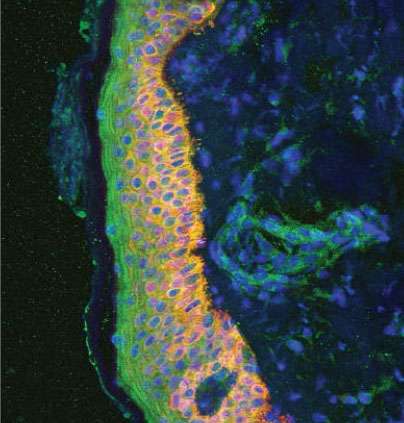Is an agent used to treat psoriasis aimed at the wrong target?

The antibody ustekinumab is in use for treatment of psoriasis since 2009. It inhibits the underlying inflammation by neutralizing certain messengers of the immune system. Researchers at the Helmholtz Zentrum München, the Technical University of Munich and the University of Zurich have now shown in 'Nature Communications' that one of these messengers could actually be helpful in battling the illness.
Common psoriasis, also called psoriasis vulgaris, is an inflammatory skin disease that is characterized by severely scaling skin in areas ranging from small to palm-sized. The disease is estimated to affect between two and three percent of all Europeans.
The cause is said to be immune system malfunctions. The treatment therefore aims to 'pick off' the inflammation messengers. For example, the antibody ustekinumab should bind the two interleukins (IL) 12 and 23 and consequently inhibit their supposedly proinflammatory effects. The substance is especially used to fight plaque psoriasis in patients who fail to respond to superficial therapies.
"The findings of the last ten years have shown that IL-23 is the dominant driving force behind psoriasis," explains Dr. Stefan Haak, one of the study leaders and research group leader at the Center of Allergy and Environment (ZAUM), a joint undertaking of the Helmholtz Zentrum München and the Technical University of Munich (TUM). "However, according to our study, IL-12 has a positive effect on the skin affected by psoriasis."
In their study, the researchers first used experimental models to examine the influence of the individual messengers IL-12 and IL-23 on skin cells. These tests showed that IL-12 activates a protective program in the skin cells themselves and prevents the infiltration of certain pathogenic immune cells (IL-17-producing T cells), which inhibits the inflammatory reaction.
Prof. Dr. Burkhard Becher from the University of Zurich, who is also playing a leading role in the study, assesses the results: "Our experiments indicate that IL-12, unlike IL-23, has a quite positive effect in the skin affected by psoriasis. Because the active substance ustekinumab, which is routinely used in treating psoriasis, neutralizes both IL-23 and IL-12, however, there should be a thorough examination of whether or not the effect on IL-12 is counterproductive."
The scientists plan further research in the future to see if IL-12 could also have a positive effect on other symptoms. They criticize that its role and mode of action have not been sufficiently investigated so far. Study leader Haak: "New data from clinical studies support our hypothesis and the specific inhibition of the IL-23/Il-17 axis alone would probably be a better-targeted alternative."
More information: Paulina Kulig et al. IL-12 protects from psoriasiform skin inflammation, Nature Communications (2016). DOI: 10.1038/ncomms13466

















